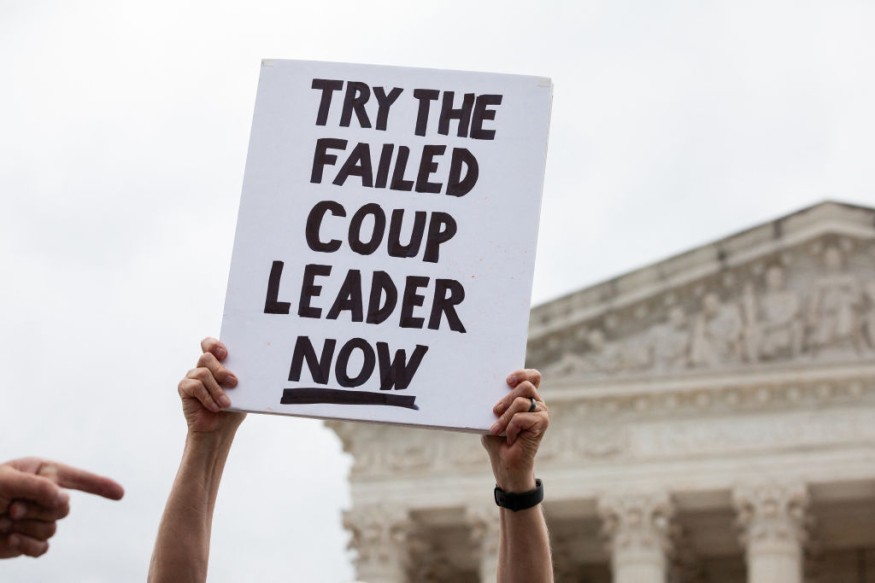Donald Trump Wants Porn Star Hush Money Sentencing Delayed After Supreme Court Decision

The sentencing for the Donald Trump porn star hush money trial has been delayed after the Supreme Court granted full immunity to presidents for official acts. Manhattan District Attorney Alvin Bragg has also agreed to the delay after the Supreme Court ruling even though the crime was made while Trump was still a candidate and not as president.
The former president is now considered a convicted felon after he was found guilty of 34 felony counts of falsifying business records over paying hush money to porn star Stormy Daniels while he was still running for office. These payments were used to cover up his affair and help him win the 2020 election against Hillary Clinton.
As NPR noted, the post-trial proceedings are already underway, with the former president already completing his post-conviction interview and both sides having already submitted their sentencing recommendations. This only left the sentencing on July 11, which has now officially been delayed.
Alvin Bragg and prosecutor Matthew Colangelo were expected to testify on Capitol Hill after the sentencing to answer the summons from Republican lawmakers allied to the former president as they try to interfere in an independent court decision.
In his response to the delay request from the Trump legal team, Bragg noted that even though they believe the arguments for a delay are without merit, they will not oppose the request. While the Supreme Court immunity ruling was for presidents doing official acts, Donald Trump made those hush money payments while he was still a candidate.
When he paid back Michael Cohen while already president, he did so as Donald Trump the businessman as they were made through the Trump Organization and not officially from the government,
Analyst Says Alvin Bragg Agreeing to Porn Star Hush Money Case Sentencing Was a 'Wise' Decision
"Although we believe the defendant's arguments to be without merit, we do not oppose his request for leave to file and his putative request to adjourn sentencing pending determination of his motion," wrote Assistant District Attorney Joshua Steinglass in his letter to Judge Juan Merchan. Though they strongly oppose the move, why did they allow it to go through?
READ MORE : Trump Supporters Get Poked Fun At, Get Their Flawed Logic Exposed by Daily Show's Jordan Klepper
According to Newsweek, this was considered a "wise" move, as explained by legal analyst Shanlon Wu, who noted that agreeing to postpone sentencing to give Judge Merchan more time to consider was "judicious."
"Manhattan DA Alvin Bragg has agreed to postponement of Trump sentencing in light of Trump's lawyers arguing the SCOTUS immunity decision entitles them to dismissal of the conviction-they will lose that argument but judicious of Bragg to give Judge Merchan time to consider," the analyst said.
Supreme Court Immunity Decision May Also Backfire on Donald Trump
While the Supreme Court immunity decision was considered a win for the former president, MSNBC's Lawrence O'Donnell noted that the ruling could ultimately backfire for the former president as a hearing to decide what crimes would be considered official acts and unofficial acts would be done and it could be used to turn voters away from him.
"The very bad news for Donald Trump in this decision today, and for candidate Trump - very, very bad - is that Mike Pence is going to walk into a federal courtroom, raise his right hand, take an oath to tell the truth, and testify against Donald Trump in this case in September," said O'Donnell.
"You're gonna see this incredible Jan. 6 hearing on steroids, possibly for six, eight weeks, September [to] October, maybe," he added, pointing out that Judge Tanya Chutkan will oversee that hearing, which will be "exactly like a prosecution" as "special counsel Jack Smith calls witnesses and lays out his evidence."
READ MORE : Robert Morris, Texas Megachurch Pastor and Donald Trump Spiritual Advisor, Admits to Child Sexual Abuse
This article is owned by Latin Post.
Written by: Rick Martin
WATCH: Lawrence reveals the 'very bad news' for Trump in the immunity decision - MSNBC
Subscribe to Latin Post!
Sign up for our free newsletter for the Latest coverage!
© 2026 Latin Post. All rights reserved. Do not reproduce without permission.













